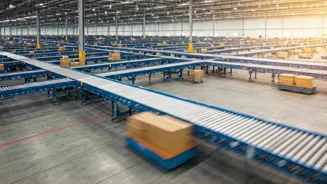Massive Sectoral Growth
The Indian logistics sector is on track for a period of significant expansion. Projections indicate that the sector is poised to reach a staggering ₹120
trillion by the year 2035. This ambitious forecast paints a picture of a rapidly evolving economic landscape and underscores the critical role logistics will play in India's future prosperity. The sheer scale of this expected growth highlights the sector's immense potential for investment, innovation, and job creation. The expanding logistics network is designed to support various industries across India, allowing businesses to transport goods and services. The growth is expected to support multiple industries, driving a wider economic boom and reinforcing India's position on the global stage.
Key Growth Drivers
Several pivotal factors are contributing to the anticipated surge in India's logistics sector. Firstly, the ongoing and accelerated development of infrastructure is creating a robust foundation for improved connectivity and efficiency. This involves investments in roadways, railways, ports, and airports, all of which are vital for the seamless movement of goods across the country. Secondly, the government's sustained focus on streamlining logistics processes and promoting policy reforms has enhanced efficiency. Efforts to reduce bottlenecks, modernize regulations, and encourage the adoption of technology are paying dividends. Moreover, the expansion of e-commerce and the rise of organized retail are amplifying the demand for sophisticated and responsive logistics solutions. These consumer trends drive businesses to focus on optimizing their supply chains to ensure timely delivery and customer satisfaction. Finally, foreign direct investment (FDI) into the sector is injecting capital and introducing global best practices. This, in turn, allows companies to enhance their efficiency and offer superior services.
Boosting Economic Impact
The remarkable growth anticipated within the logistics sector is poised to generate wide-ranging economic impacts. An expanded logistics infrastructure will undoubtedly foster greater trade and investment. This can boost the competitiveness of Indian businesses in the global market, unlocking new opportunities for exports and stimulating economic activity. Moreover, the sector’s expansion is likely to lead to a significant increase in employment opportunities. This includes positions in transportation, warehousing, supply chain management, and other related fields, potentially benefiting various skill sets. The evolution of the logistics sector will also spur innovation and the adoption of advanced technologies, such as automation, data analytics, and blockchain. This technological evolution could increase the productivity of the sector, optimizing the flow of goods, and generating efficiencies, leading to lower costs and better services for businesses and consumers. This projected growth demonstrates the vital importance of the logistics industry for India's prosperity.
Future Considerations
While the outlook for India's logistics sector appears optimistic, various challenges and opportunities will shape its trajectory. Addressing infrastructure gaps remains essential, especially in rural areas, to ensure seamless connectivity. Investing in skill development and training programs will be critical to meet the growing demand for skilled professionals within the sector. Furthermore, sustainability will become an increasingly significant consideration, with a push for greener logistics solutions, including the adoption of electric vehicles and fuel-efficient transportation methods. A focus on integrated logistics models, combining various modes of transport, and adopting digital platforms can enhance efficiency and transparency. Lastly, continued policy support and regulatory reforms will be crucial for fostering growth and encouraging investment in the sector, ensuring India realizes the full potential of its logistics capabilities.










![[WATCH] 'Real Madrid, Ramadan and rest' - Mohammed Siraj how last-minute World Cup call-up changed February plan](https://g-mob.glance-cdn.com/public/fc/image/ByYT_LEmlrD0.webp)




